Gifted Education Symposium Reveals The Trends in 21st Century Education
(Hong Kong – 14 July 2018) The Hong Kong Academy for Gifted Education (HKAGE), in celebration of its 10th anniversary, is organising a series of events, collectively titled “Going Beyond Giftedness”. The Gifted Education Symposium (Symposium), one of the signature events which is held at the New World Millennium Hong Kong Hotel today, was officiated by Mr Kevin Yeung Yun Hung, JP, Secretary for Education, Education Bureau.
Ms Emily Lau, JP, a member of the Board of Directors of HKAGE, said, "I am very happy to attend today's event, to celebrate the 10th anniversary of HKAGE, which is moving towards a new milestone. Together, we will explore new directions for Hong Kong education. Ten years ago, Sir Joseph Hotung has already seen the importance of gifted education in Hong Kong. Sir Joseph Hotung and the Hong Kong Government have each donated $100 million to a total of $200 million to set up the Hong Kong Academy for Gifted Education. Despite lack of sufficient resources, the staff of HKAGE are still working hard to create rich variety of programmes for gifted students, so that their potentials can be fully unleashed in different fields.
About four years ago, I was nominated by Sir Joseph Hotung to become a member of the Board of Directors of HKAGE and participate in gifted education affairs. Amid the economic pressure faced by the Academy, the Education Bureau funded the Academy through the Gifted Education Fund in September last year to continue its development and shoulder the mission of promoting gifted education. When the Government decides to subsidise HKAGE, it also means that the Government believes that it is necessary to formulate a formal gifted education policy. I hope that the Government can put in more resources in the future to support the development of the Academy. For example, resources needed to support affective education and twice exceptional students. At the end, the potential of different types of gifted students can be fully developed to create a new situation of Hong Kong society.”
Mr Kevin Yeung Yun Hung, JP, said in his opening remarks, “I am delighted to officiate at this 10th Anniversary Gifted Education Symposium of HKAGE. This symposium provides a good platform for experts from overseas to exchange experiences and ideas with local practitioners, to shed light on the future development strategies of gifted education, especially in the STEM-related disciplines. According to the U. S. Department of Commerce, STEM occupations are growing at 17%, while other occupations are growing at 9.8%. STEM education creates critical thinkers, increases science literacy, and enables the next generation of innovators. To succeed in this new information-based and highly technological world, our students need to develop their capabilities in STEM to levels much beyond what was considered acceptable in the past.
This symposium also serves as a kick-starter for international conferences, research and exchanges on gifted education to be initiated by the Academy, with the ultimate goal of developing Hong Kong into a regional gifted education hub. Today’ s keynote address and the panel discussion enables us to have the opportunity to inspire one another for best practices of fostering our gifted students to thrive on problem solving, creativity and innovation. ”
Exploring Future Education Development
Themed “Trends in 21st Century Education”, the Symposium aims to explore and investigate the future developments in the field of education and hence to stimulate new ideas and initiatives to the educators and practitioners of this field. Internationally renowned scholars, Prof. Jeanne Century and Prof. MSO Jacob Friis Sherson will give an overview of the global trends in STEM Education and how to enhance learning efficient via science games.
A panel discussion was held by prominent local educators on the innovative development of education in Hong Kong. Prof. Lui Tai Lok, Vice President (Research and Development) of the Education University of Hong Kong, was chairing the discussion session. Speakers include Prof. Ng Tai Kai, Executive Director of HKAGE; Prof. King Chow, Director of the Centre for the Development of Gifted and Talented, Hong Kong University of Science and Technology; and Prof. Kenneth Sin, Director of The Centre for Special Education Needs and Inclusive Education, the Education University of Hong Kong. The three speakers expressed their views and explored the direction of Hong Kong's educational innovation.
(Appendix 1)
Profiles of Keynote Speakers:
Prof. Jeanne Century
Jeanne Century is the Director of Outlier Research & Evaluation at UChicago STEM Education and a Research Associate Professor at the University of Chicago. UChicago STEM Education is a Centre devoted to bridging research and practice to further quality education. Outlier is a group within UChicago STEM Education that works to empower those who seek to advance and improve education with the knowledge, tools and support to realise change. Prof. Century has spent the majority of her thirty-year career working in and with urban schools as well as large urban school districts across the United States. She has developed comprehensive science instructional materials, and been part of professional development, technical assistance and strategic planning efforts for teachers, school and district administrators, and state leaders across the country. Prof. Century has conducted evaluations of a wide variety of programmes, for learners of all ages in both, school and out-of-school settings. These settings have ranged from programmes run by zoos and museums to summer camp and computer science programmes run by Google, to leadership academies. Her research efforts have focused on the impact of inquiry science instruction, improving utilisation of research and evaluation, measurement of fidelity, implementation and sustainability of innovations through implementation science, STEM schools, computer science education and digital media tools and technologies. Century serves on several advisory boards for National Science Foundation-funded projects. She also served on the transition team for the Obama-Biden administration where she focused on STEM education and in 2010 shared the National Association for Research in Science Teaching award for the most significant publication of the year.
Prof. MSO Jacob Friis Sherson
Jacob Friis Sherson is a (MSO) Professor at the University of Aarhus, Denmark, he is originally a quantum physicist and has previously set a world record for quantum teleportation and is now trying to build a quantum computer. In an unconventional approach to research & education, he established the citizen science project ScienceAtHome seeking to utilise gamification to exploit the unique human intuition. The first citizen quantum optimisation results were published in 2016 in Nature and received global media attention; LA Times wrote “Take that AI, video gamers solve quantum physics mystery”. To further investigate the potential of the approach and understand the general cognitive processes leading to this “quantum intuition”, he has expanded the project to include citizen science games in mathematics, chemistry, economics, and cognitive and social science. He sees this as first steps of establishing an online social science super collider infrastructure that will allow large scale investigations of individual and collective behaviour. As a first step in this direction, his team has recently launched, Skill Lab, a set of minigames aimed at creating a game-based cognitive profiling on a massive scale.
Moreover, he has the strong belief that citizen science games hold the potential to revolutionise class-room teaching. He has therefore introduced the educational paradigm, Research-Enabling Game-Based Education (ReGAME), in which citizen science games are used to illustrate the importance of the core curriculum of the students. He thereby attempts to dramatically increase student motivation and “love of learning” by making learning epic, rather than simply making it fun as in traditional game-based education. He has cofounded the global educational movement, Think Like a Scientist (TLS), dedicated to bringing together and exploring synergies between institutions with an interest in fostering critical thinking in schools. Together with global TLS partners in e.g. Hong Kong, France and USA, he is currently working to make ReGAME modules available globally.
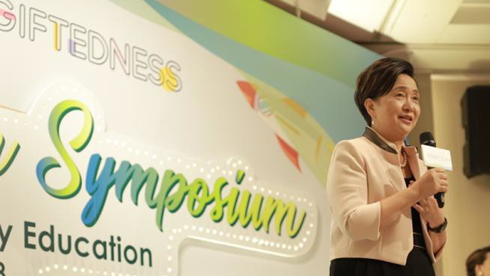 | 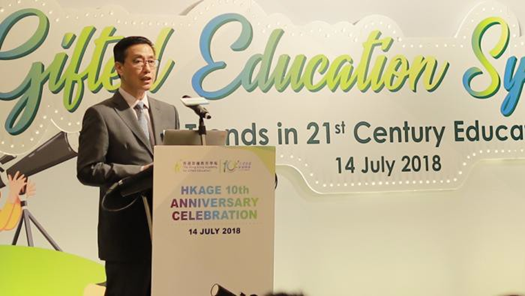 |
| Ms Emily Lau, JP, a member of the Board of Directors of HKAGE delivered the welcoming remarks. | Mr Kevin Yeung, Yun Hung, JP, Secretary for Education, Education Bureau, served as the officiating guest of this Symposium. |
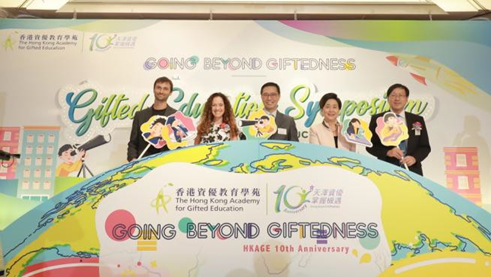 | 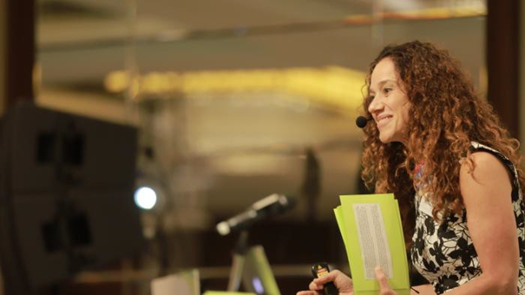 |
| At the gifted education symposium, the guests of honour were invited to take a group photo. | Prof. Jeanne Century, Director of Outlier, Research and Evaluation, at. Chicago STEM Education, University of Chicago, USA. |
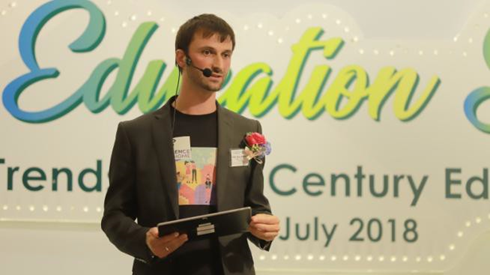 | 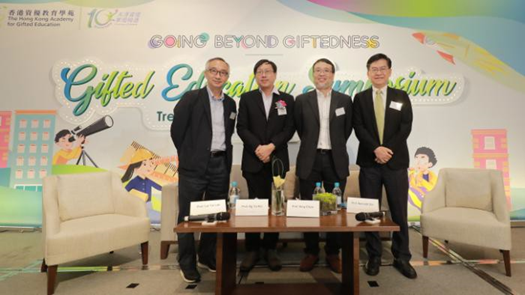 |
| Prof. (MSO) Jacob Friis Sherson, Director and Founder of the ScienceAtHome project and Centre for Community Driven Research, (CODER), Department of Physics and Astronomy, Aarhus University, Denmark. | A panel discussion was held by prominent local educators on the innovative development of education in Hong Kong. Prof. Lui Tai Lok, Vice President (Research and Development) of the Education University of Hong Kong was chairing the discussion session. Speakers include Prof. Ng Tai Kai, Executive Director of HKAGE, Prof. King Chow, Director of the Centre for the Development of Gifted and Talented, Hong Kong University of Science and Technology, and Prof. Kenneth Sin, Director of The Centre for Special Education Needs and Inclusive Education, the Education University of Hong Kong. |






